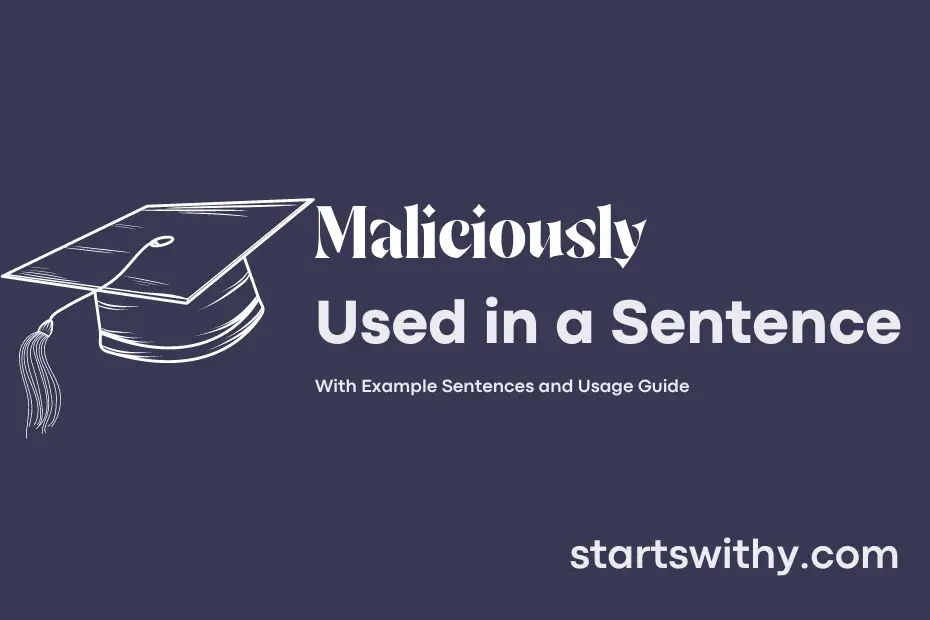Have you ever heard of the term “maliciously”? It refers to the intention or action of causing harm or suffering to others on purpose. This word is commonly used in legal contexts and discussions about harmful behaviors.
When someone behaves maliciously, they do so with ill will and the desire to cause trouble or harm. It implies a deliberate and harmful intent behind the actions taken. Understanding the implications of acting maliciously can help in identifying and addressing harmful behavior in various situations.
7 Examples Of Maliciously Used In a Sentence For Kids
- The cat maliciously knocked over the flower pot.
- The squirrel maliciously stole all the nuts from the tree.
- The witch maliciously cast a spell on the princess.
- The ghost maliciously scared the children at night.
- The dragon maliciously breathed fire on the village.
- The wolf maliciously howled at the moon.
- The pirate maliciously hid the treasure on the island.
14 Sentences with Maliciously Examples
- The student maliciously spread false rumors about his classmate to tarnish their reputation.
- She maliciously sabotaged her group project by not fully completing her assigned tasks.
- He maliciously deleted important files from the shared drive to hinder his classmates’ progress on their group assignment.
- The peer reviewer maliciously gave unfavorable feedback on his classmate’s presentation out of spite.
- The student maliciously hid the textbooks that were needed for an upcoming exam.
- She maliciously gave incorrect study materials to her friend to mislead them on purpose.
- He maliciously reported his fellow student’s innocent actions to the college authorities.
- The classmate maliciously posted embarrassing photos of others on social media.
- She maliciously altered the dates on the shared calendar to create confusion among her classmates.
- The student maliciously altered the content of his friend’s presentation without their knowledge.
- He maliciously pretended to help his classmate with a project but intentionally gave misleading advice.
- She maliciously spread misinformation about a college event to create chaos and confusion.
- He maliciously submitted plagiarized work under his classmate’s name to get them in trouble.
- The student maliciously gave incorrect study notes to his friend before an important exam.
How To Use Maliciously in Sentences?
To use the word Maliciously in a sentence, you must understand that it is an adverb that describes an action done with the intention of causing harm or mischief.
Here is an example of how to use Maliciously in a sentence: “The hacker maliciously planted a virus in the company’s computer system.”
In this sentence, the word Maliciously emphasizes that the hacker’s action was intentional and meant to cause harm.
When incorporating Maliciously into a sentence, it is important to consider the context in which it is being used. Make sure the action being described is deliberate and with harmful intent.
To improve your understanding and usage of the word Maliciously, consider practicing by creating your own sentences using it. This will help you become more familiar with the word and how to incorporate it effectively into your writing.
Remember that Maliciously is a strong word that carries a negative connotation, so use it carefully and appropriately to convey the intended meaning in your sentences.
Conclusion
In conclusion, sentences that are crafted maliciously with the intention to harm or deceive can have serious repercussions. Whether used to spread false information, sow discord among people, or manipulate individuals, such sentences can damage trust, relationships, and even lives. It is important to be vigilant and critical of the information we consume, especially in an age where maliciously constructed sentences can easily spread through social media and other online platforms.
By educating ourselves on how to identify and combat maliciously worded sentences, we can better protect ourselves and others from falling victim to their harmful effects. Promoting honesty, integrity, and fact-checking can help create a more trustworthy and informed society, ultimately reducing the impact of maliciously worded sentences on individuals and communities.



